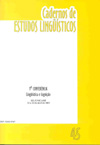Abstract
We consider three important notions to Cognitive Linguistics – the notions of mental spaces, metaphor and prototypes, discussing their status as real theories, as they’re usually taken, or as notions which must interact with others in equivalent conditions, or they should be treated as epiphenomena in the Cognitive Linguistics framework.References
BLOCK, N. (1995). On a confusion about a function of consciousness. Behavioral and Brain Sciences 18 (2): 227-287.
CAREY, S., SPELKE, E. (1994). Domain-specific knowledge and conceptual change. In: HIRSCHFELD, L.A., GELMAN, S. A. (eds.). Mapping the Mind: domain specificity in cognition and culture. Cambridge: University Press.
CUTRER, M. (1994). Time and tense in narratives and in everyday language. Ph.D. dissertation. University of California at San Diego.
FAUCONNIER, G. (1994[1985]). Mental spaces. Cambridge: University Press.
FAUCONNIER, G. & TURNER, M. Blending as a central process of grammar. In: GOLDBERG, Adele (ed.) (1993). Conceptual structure, discourse and language. Stanford: CSLI.
FAUCONNIER, G. (2002). The way we think: conceptual blending and the mind’s hidden complexities. New York: Basic Books.
GERHARDT, A. F. L. M. (2002). A semântica das construções gramaticais e o presente do Indicativo em português. Tese de Doutorado em Língua Portuguesa. Rio de Janeiro: UFRJ.
GERHARDT, A. F. L. M. & PINHEIRO, D.R. Locatividade, existência e posse na gramática do português. UFRJ. Inédito.
GIVÓN, T. (1984). Syntax: a funcional-typological introduction. Amsterdam/ Philadelphia: John Benjamins.
JOHNSON, M. (1992). The body in the mind: the bodily basis of meaning, imagination and reason. Chicago: University Press.
KARMILOFF-SMITH, A. (1992). Beyond modularity: a developmental perspective on cognitive science. Cambridge, MA: The MIT Press.
LAKOFF, G. (1987). Women, fire and dangerous things: what categories reveal about the mind. Chicago: University Press.
LAKOFF, G. & JOHNSON, M. (1980). Metaphors we live by. Chicago: University Press.
MIRANDA, N. S. (2000). A configuração das arenas comunicativas no discurso institucional: professores versus professores. Tese de Doutorado em Educação. Belo Horizonte: UFMG.
MITHEN, S. (2002). A pré-história da mente: uma busca das origens da arte, da religião e da ciência. São Paulo: Editora UNESP.
ORTONY, A. (ed.) (1993). Metaphor and thought. 2. ed. Cambridge: University Press.
QUARTZ, S. & SEJNOWSKI, T.J. (1997). The neural basis of cognitive development: A constructivist manifesto. Behavioral and Brain Sciences 20 (4): 537-596.
ROSCH, E. (1973). On the internal structure of perceptual and semantic categories. In: MOORE, T. (ed.). Cognitive development and the acquisition of language. New York: Academic Press.
ROSCH, E. (1978). Principles of categorization. In: ROSCH, Eleanor, Lloyd, B. B. (eds.) Cognition and categorization. Hillsdale, NS: Lawrence Erlbaum.
ROSCH, E. (1999). Reclaiming concepts. In: NUNEZ, R., FREEMAN, W. J. (eds.). Reclaiming cognition: the primacy of action, intention and emotion. Thorverton, Eng.: Imprint Academic.
ROZIN, P. (1986). The evolution of intelligence and access to the cognitive unconscious. In: SPRAGUE, J.M., EPSTEIN, A. N. (eds.). Progress in Psychobiology and Physiological psychology. New York: Academic Press.
SALOMÃO, M. M. M. (1997). Gramática e interação: o enquadre programático da hipótese sócio-cognitiva sobre a linguagem. In: Veredas: revista de estudos lingüísticos. v.1, no 1. pp. 23-39. Juiz de Fora: UFJF.
SALOMÃO, M. M. M. (1998). O papel da gramática na construção do sentido. In: VALENTE, André (org.). Língua, Lingüística e Literatura. Rio de Janeiro: EDUERJ.
SALOMÃO, M. M. M. (1999). A questão da construção do sentido e a agenda dos estudos da linguagem. In: Veredas: revista de estudos lingüísticos. v. 3, no 1. pp. 61/79. Juiz de Fora: UFJF.
SPERBER, D. The modularity of thought and the epidemiology of representations. In: HIRSCHFELD, L.A., GELMAN, S. A. (eds.). Mapping the Mind: domain specificity in cognition and culture. Cambridge: University Press.
TAYLO-R, J. R (1987). Linguistic categorization: prototypes in linguistic theory. Oxford: Clarendon Press.
TEIXEIRA, J. de F. (2000). Mente, cérebro e cognição. Petrópolis: Vozes.
TOMASELLO, M. (1999). The cultural origins of human cognition. Harvard: University Press.
The journal CADERNOS DE ESTUDOS LINGUÍSTICOS is granted all the copyright related to the published works. The originals will not be returned. By virtue of being part of this public access journal, the articles are free to use, with their own attributions, in educational and non-commercial applications

